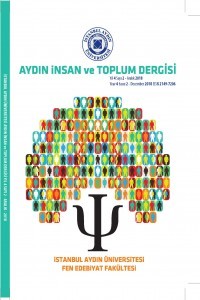Şiddet ve Zorbalığı Önleme Modeli Olarak Abuluculuk Eğitimleri
Toplumsal yaşam ve insanlık için bir tehdit olarak daima karşımıza çıkan saldırganlık davranışı ne yazık ki günümüzde artarak devam etmektedir. Okullarda, çocuk ve gençler arasında yaygınlaşan, şiddetin bir sorun çözme yöntemi olarak kullanılmasının istenmeyen sonuçlarını son yıllarda sıkça yaşamaktayız. Okullarda şiddet, akran zorbalığı gibi davranışların önlenmesine yönelik önlemler alınmadığı takdirde, toplumsal barış kültürünün oluşması için hiçbir tohum ekilmemiş olduğunu söylemek mümkündür. Tohum olmayan yerden de ürün beklemek sadece hayalcilik olacaktır. Bu konularda yapılan pek çok çalışma bulunmakla birlikte, önleyici çalışmalar kapsamında, yeni ve değişen projelere ihtiyaç olduğu açıktır. Bu tür programlar okul-aile-çevre üçgeni içinde yürütülmeli, uzun bir sürece yayılmalı, kazanımların içselleştirilmesi ve davranışa dönüşmesi konusunda değerlendirmeler yapılmadan da sonlandırılmamalıdır.Barış toplumuna ulaşma çabaları içinde toplumsal şiddet ve türevlerinin ortadan kaldırılmasına yönelik çalışmaların önemi büyüktür. Çatışma çözmeye yönelik becerilerin erken yaşta kazanılması, kazanımların içselleştirilmesi bakımından önemlidir. Bu nedenle çalışmada, okullarda planlanan akran arabuluculuğu örnekleri ele alınmıştır. AMAÇ: Bu çalışmanın amacı, çatışma çözümünde şiddet kullanımını ortadan kaldırmaya yönelik eğitimlerin yerini ve bu tür eğitimlerin geniş ölçekte ele alınmasının önemini bir kez daha vurgulamak ve çalışmaların yaygınlaştırılması yolunda mesaj vermektir
Anahtar Kelimeler:
Akran Arabuluculuğu, Çatışma Çözümü, Şiddet
Mediation Training as a Model of Prevention of Violence and Bullying
Aggression always occurs as a threat against social life and humanity, and unfortunately nowadays it continues to increase. Violence has become common among children and young people in schools. We are experiencing the unintended consequences of using violence as a problemsolving method, in recent years frequently. human characteristics. Children are shaping by the society where they live in, during their developmental process. They are also influenced by the environment in terms of both their personal and social development. Improvement of social cognition in societies has an important place in children’s multifaceted development process. Conflict should not be seen as a problem in schools or in any place, unlike it is a part of the solution. Schools should have a positive approach to conflicts. The important thing is to manage conflict in a constructive manner.Peer mediation is a voluntary participation in a structured process by an objective third peer student to facilitate two or more students who are facing a conflict among themselves, to resolve the conflict and reach an agreement. Target of these programs is to make children and young people who will become adults of the future has gain the necessary skills in order to reach “the peace community”. These kinds of programs should be conducted in school-family-environment triangle, and spread over a long process, and should not be terminated without an evaluation to follow up whether those skills gained through the program are internalized and convert into behaviour. Studies about elimination of societal violence are very important for the efforts to reach peace in the whole society. To gain skills in conflict resolution in early childhood is crucial in terms of the internalization of those gains. For this reason, the examples of peer mediation which are planned in schools discussed in this study.AIM: The aim of this study is to highlight the trainings about elimination of using violence in conflict resolution, and to emphasize the importance of these kinds of training again and to give a message for dissemination of studies in this area
Keywords:
Peer Mediation, Conflict Resolution, Violence,
___
- AHMED, E., BRAITHWAITE, V. (2004). BullyingandVictimization: Cause for Concern for Both Families and Schools. Social Psychology of Education, 7, 35-54.
- CRAIG, W. M., PEPLER, D. J. (2003). Identifying and Targeting Risk for Involvement in Bullying and Victimization. The Canadian Journal of Psychiatry, 48, 577-582.
- FROMM, E. (1993), İnsan Davranışındaki Yıkıcılığın Kökenleri, İng. lk basım: 1973: Çev: Şükrü Alpagut, Payel Yayınları, S.236, İstanbul.
- GÖKLER, R. (2009), Okullarda Akran Zorbalığı, International Journal of Human Sciences, Vol:6, No:2.
- JOHNSON, D.W. and JOHNSON R.T. (1996,a), Training elementary school students to manage conflict. Journal of Group Psychotherapy, Psychodrama & Sociometry, 49 (1), 24-38.
- JOHNSON, D.W. and JOHNSON R.T. (1996,b), Teaching all students how to manage conflicts constructively: The peace makers program, The Journal of NegroEducation, Vol. 65, No. 3, Educating Children in a Violent Society, Part I (Summer, 1996), pp. 322-335.
- KAÇMAZ, T., TÜRNÜKLÜ, A., TÜRK, F., (2011), Akran Arabulucuların Gözünden İlköğretim Öğrencilerinin Arabuluculuk Sürecinde Yaşadıkları Güçlüklerin İncelenmesi, Kuram ve Uygulamada Eğitim Yönetimi2011, Cilt 17, Sayı 4, ss: 555-579. (Educational Administration: Theory and Practice 2011, Vol. 17, Issue 4, pp: 555-579)
- KOHUT, H. (1977), Therestoration of the self, Int. Uni. Press, New York.
- KORUKLU, Öner, N., (2006), Eğitimde Arabuluculuk Ve Okulda Arabuluculuk Sürecinin işleyişine ilişkin bir model, Dokuz Eylül Üniversitesi Buca Eğitim Fakültesi Dergisi 20: 11
- KOLBURAN, G., (1998), Eş öldürme olgularında sosyal, psikolojik ve kültürel faktörler, İ.Ü. Adli Tıp Enstitüsü Sosyal Bilimler Anabilim Dalı, Doktora tezi, İstanbul).
- OLWEUS, D. (1999), Thenature of school bullying: A crossnational perspective, London & New York: Routledge.
- POLAT, O. (2002), Çocuk ve Şiddet. S:85-97. Der Yayınları, İstanbul.
- SELMAN, R.L. (1977), A structural - devalopment model of socialcognition: Implications for intervention research. Counselling Psychologist, 6, 3-6.
- SWEENEY, B.,& CARRUTHERS, W. L. (1996). Conflict resolution: History, philosophy, theory, and educational applications. School Counselor, 43 (5), 326-344.
- TOTAN, T., YÖNDEM, Z.D. (2007), Ergenlerde zorbalığın anne, baba ve akran ilişkileri açısından incelenmesi, Ege Eğitim Dergisi, (8) 2: 53-68.
- TÜRNÜKLÜ, A. ve ark. (2009 a), Okul Temelli Çatışma Çözümü ve Akran Arabuluculuk Projesi. No: 106K094. Ankara: TÜBİTAK, Haziran.
- TÜRNÜKLÜ, A., KAÇMAZ, T., İKİZ, E. & BALCI, F. (2009 b). Liselerde Öğrenci Şiddetinin Önlenmesi: Anlaşmazlık Çözümü, Müzakere ve Akran-Arabuluculuk Eğitim Programı. Ankara: Maya Akademi.
- YILDIRIM, A. (1998), Sıradan Şiddet, Boyut Yayınları, İstanbul.
- ISSN: 2149-7206
- Yayın Aralığı: Yılda 2 Sayı
- Başlangıç: 2015
- Yayıncı: İstanbul Aydın Üniversitesi
